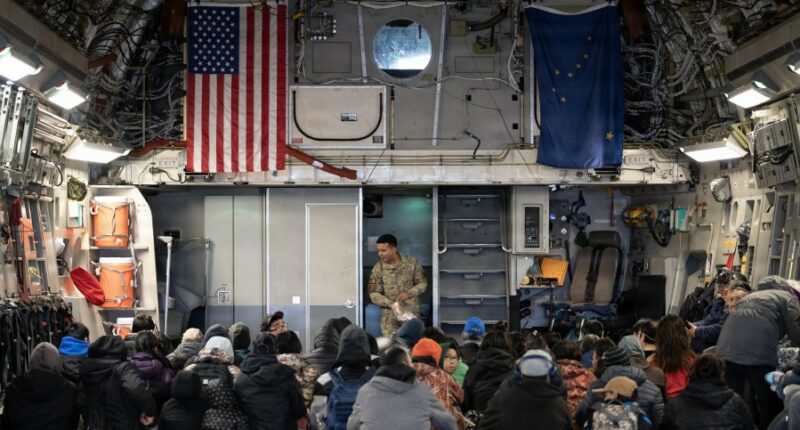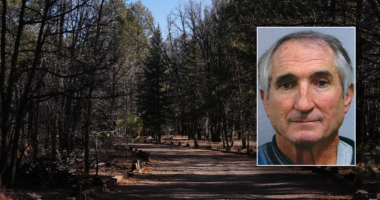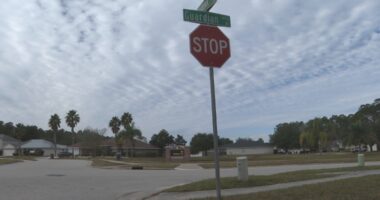Share this @internewscast.com

ANCHORAGE, Alaska (AP) — The destruction wrought by last weekend’s flooding in isolated Alaskan villages is so severe that it could be a year and a half before many of the over 2,000 displaced residents can return home, according to Governor Mike Dunleavy’s appeal for a major disaster declaration from the White House.
In Kipnuk, one of the most devastated communities, preliminary reports indicate that 121 homes—accounting for 90% of the village—have been destroyed, Dunleavy noted. Meanwhile, in Kwigillingok, where about 36 homes were swept away, more than a third of the homes are now unlivable.
The remnants of Typhoon Halong struck with the intensity akin to a Category 2 hurricane, Dunleavy explained, pushing a massive surge of ocean water into the low-lying areas. Tragically, one person lost their life, two are still missing, and rescue operations saved numerous individuals whose homes had been set adrift.
Authorities have been working tirelessly to evacuate residents from the waterlogged Alaska Native villages. Over 2,000 people across this region have sought refuge—some in local schools, others in larger southwestern Alaskan communities, or have been flown by military aircraft to Anchorage, the state’s largest urban center.
City leaders in Anchorage announced on Friday their preparation for up to 1,600 evacuees. Thus far, approximately 575 individuals have been transported to the city by the Alaska National Guard, finding temporary shelter in a sports arena or convention center. More evacuation flights were planned for Friday and Saturday.
Efforts are underway to transition evacuees from emergency shelters to temporary accommodations like hotels, with plans to eventually secure longer-term housing solutions.
“Due to the time, space, distance, geography, and weather in the affected areas, it is likely that many survivors will be unable to return to their communities this winter,” Dunleavy said. “Agencies are prioritizing rapid repairs … but it is likely that some damaged communities will not be viable to support winter occupancy, in America’s harshest climate in the U.S. Arctic.”
The federal government already has been assisting with search and rescue, damage assessments, environmental response and evacuation support. A major disaster declaration by President Donald Trump could provide federal assistance programs for individuals and public infrastructure, including money for emergency and permanent work.
The three members of Alaska’s congressional delegation on Friday sent a letter to Trump, urging swift approval.
The storm surge pummeled a sparsely populated region off the state’s main road system where communities are reachable only by air or water this time of year. The villages typically have just a few hundred residents, who hunt and fish for much of their food, and relocating to the state’s major cities will bring a vastly different lifestyle.
Alexie Stone, of Kipnuk, arrived in Anchorage in a military jet with his brothers, children and mom, after his home was struck by the flooding. They’ve been staying at the Alaska Airlines Center at the University of Alaska, where the Red Cross provided evacuees with cots, blankets and hygiene supplies.
At least for the foreseeable future, he thinks he might try to find a job at a grocery store; he used to work in one in Bethel.
“It’s going to be, try to look for a place and find a job,” Stone said Friday. “We’re starting a new life here in Anchorage.”
Anchorage officials and business leaders said Friday they were eager to help the evacuees.
“Our neighbors in western Alaska have experienced tremendous loss, devastation and grief,” Mayor Suzanne LaFrance said at a meeting of the Anchorage Assembly. “We will do everything we can here in Anchorage to welcome our neighbors and help them through these difficult times.”
State Rep. Nellie Unangiq Jimmie, of Toksook Bay, on an island northwest of Kipnuk, described for the assembly how she rode out the storm’s 100 mph (161 kmh) winds with her daughter and niece.
“We had no choice but to sit in our home and wait to see if our house is going to come off the foundation or if debris is going to bust open our windows,” she said.
It didn’t, but others weren’t as fortunate. She thanked Anchorage for welcoming the evacuees.
“You are showing my people, my relatives, my constituents, even if they are far from home, this is still Alaska land and they’re amongst families,” Jimmie said.
___
Johnson reported from Seattle.

















